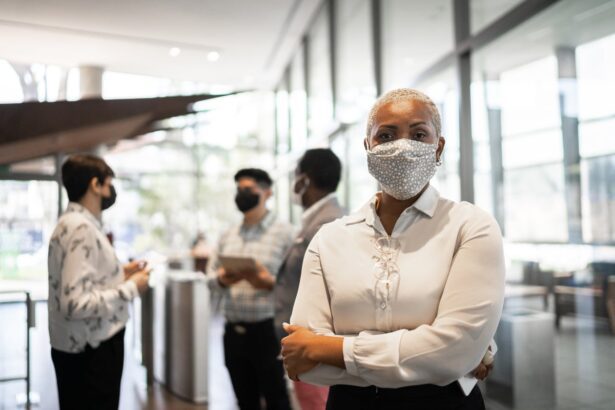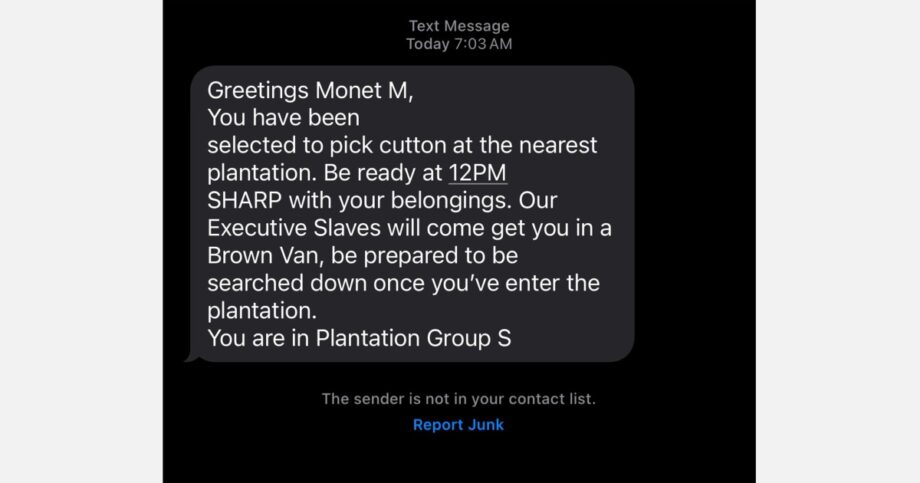Dozens of Black people across the country said they have received text messages telling them they had been “selected” to pick cotton “at the nearest plantation.”
The messages came just hours after the polarized presidential election came to a close this week.
On Wednesday morning, Monèt Miller, a publicist from Atlanta, was reeling over Donald Trump winning the White House when she received a text message from an unknown phone number.
“Our Executive Slaves will come get you in a Brown Van,” the message read, “be prepared to be searched down once you’ve enter the plantation.”
Miller, 29, was shocked. She wondered how the person got her phone number, and questioned whether she was being watched. In a panic, she responded, “Who is this?! I’m going to find who you are” and shared a photo of the text on social media. She learned that some of her friends had received the same text.
“It’s a scare tactic,” Miller said in an interview. “I saw it and was like, ‘What in the world?’ Usually, in any other instance, someone is racist to the point where it’s funny, it’s a bad humor sort of funny. But that day, with the climate and everything going on, I genuinely felt scared.”
Black social media users across the country said they have received text messages similar to Miller’s. Many of the recipients are college students from a wide range of schools nationwide, including Ohio State University, Clemson University in South Carolina, the University of Southern California and Missouri State University, NBC News has confirmed.
Domonique Valles, 23, who attends the University of Southern California, said he and some of his fellow Kappa Alpha Psi frat brothers who received the text messages and has since filed a complaint with the FBI.
“I definitely feel kind of unsafe on campus,” Valles said. While he said he’s unclear what the campus can do to make people feel safe, “they definitely need to at least come in support of people who are suffering from this Black community.”
In a statement, the university called the messages “hateful and unacceptable,” and added that it was referring students who received them to the campus Office for Equity, Equal Opportunity, and Title IX.
The FBI said in a statement Thursday that it is aware of the texts, has been in contact with the U.S. Department of Justice and encourages people who receive them to report the messages to local law enforcement authorities.
Various Clemson University students reported receiving the text messages, prompting a public statement from the school. “These numbers have been determined to be associated with online spoofing sites.” Campus police is “actively investigating the matter and working with state partners to identify the source of the messages,” the statement reads in part.
It is unclear who is behind the mass text messages, what motivated them or how they obtained phone numbers for swaths of Black people. But some of the anonymous numbers appear to be tied to TextNow, a text messaging service that allows users to obtain untraceable, “burner” phone numbers.
A TextNow spokesperson told NBC News in a statement that it is aware of the messages. “As soon as we became aware, our Trust & Safety team acted quickly, shutting down the accounts involved within the hour,” the statement said. “TextNow is proud to be an inclusive service offering free mobile text and data to millions of Americans. We do not tolerate or condone the use of our service to send harassing or spam messages and will work with the authorities to prevent these individuals from doing so in the future.”
The Attorney General’s Office in Virginia condemned the messages Wednesday and directed anyone who “believes themselves to be under threat” to contact law enforcement. Police departments and leaders in cities across the country have also addressed the situation.
People as young as high school students, and some beyond college have also received these messages, which began rolling out the morning after Election Day. Some of the messages mention Donald Trump.
Brian Hughes of the Trump campaign denounced the texts and said it is “absolute nonsense” to link the president to the messages.
“If we can find the origin of these messages which promote this kind of ugliness in our name we will obviously take legal action to stop it,” Hughes said in a statement to NBC News.
“President Trump built a diverse and broad coalition of support, with voters of all races and backgrounds,” he added. “The result was a landslide victory for his common sense mandate for change. This will result in a second term that is beneficial to every working man and woman in our nation.”
Some recipients responded to the texts with anger and others with a sense of humor, but many agree that the messages seem to be a bleak foreshadowing. The NAACP condemned the messages, saying they believe the messages were a product of the president-elect’s rhetoric.
“The unfortunate reality of electing a President who, historically has embraced, and at times encouraged hate, is unfolding before our eyes,” the statement read.
Although college students seem to be the most targeted with the texts, Black people of varying ages have reported receiving the messages. Corryn Freeman, 35, of Fort Lauderdale, Florida, said she along with her friends’ high school-age students have received the messages. She said that if the texts are a mass spam operation, it may signal danger for the recipients, that, “our collective safety is potentially at risk.”
“I don’t think that it’s a coincidence that this is happening just a day after a Donald Trump election,” Freeman told NBC News. “I think that the election has reignited and inflamed people who have racist tendencies to show up and show out. I think that this is intentional to scare people of color, Black people, into a reality that we don’t want to go back to.”
Black Democrats weren’t the only recipients of the text messages. John Anthony, a Black Republican who hosts a conservative radio show in Illinois, said he received the message Wednesday afternoon and immediately chalked it up to a leftist ploy.
“They tried to make it appear as if it came from Trump or Republicans,” Anthony said of the message, adding that he believes the message came from a “leftist organization” hoping to sow racial discord. “This is the beginning of the, ‘let’s go after Trump and his supporters’ type of thing. That’s what I got out of it.”
The Federal Communications Commission said in a statement that it was aware of the messages and “is looking into them alongside federal and state law enforcement.”
A spokesperson for the CTIA, the official trade association representing the wireless communication industry, told NBC News in a statement that several wireless carriers were impacted by the mass texts and the association is “pushing back on the aggregators which handle text message campaigns like this from the outset.”
The text messages seemed to have died down as of Thursday evening, but Miller said she’s afraid that they may only be the start of an onslaught of racist targeting.
“Now, people are testing the limits of how far they can go with playing with people,” she said. “I definitely see that this is just the beginning … I just feel like we’ll be attacked more in person in the future rather than behind phone screens.”




